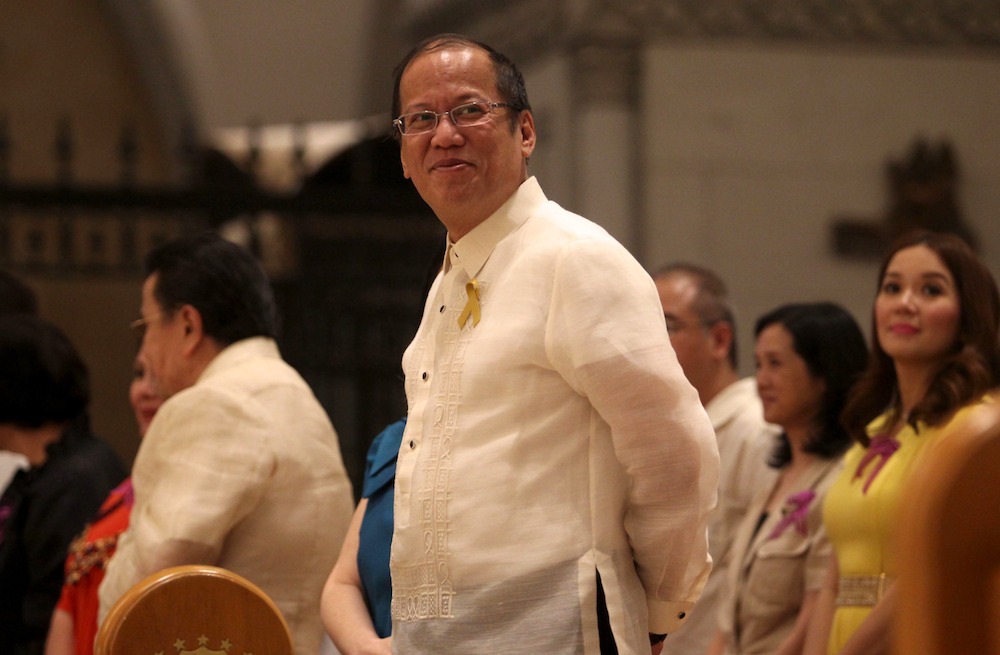SUMMARY
This is AI generated summarization, which may have errors. For context, always refer to the full article.

MANILA, Philippines – While President Benigno Aquino III still enjoys the approval and trust of majority of Filipinos, the results of the latest survey by pollster Pulse Asia Research Incorporated indicate a slight dip in his ratings in March compared to December last year.
The results of Pulse Asia’s Nationwide Survey on the Performance and Trust Ratings of the President – conducted from March 19 to 26 – show an erosion in public approval and trust in Aquino among residents in Metro Manila and the Visayas, and among those at the top and bottom of the social ladder.
Seven in 10 Filipinos or 70% approve of the President’s performance in March, according to survey results released on Thursday, April 10. It represents a 3-percentage-point decrease from his 73% rating in December 2013.
In terms of geographical location, the biggest decline in public approval for Aquino was in the National Capital Region (NCR), from 69% in December to 57% in March, or a 12-percentage point dip. This was followed by the Visayas with a 10-percentage point decrease, from 82% to 72%.
The President maintained his approval rating in Balance Luzon at 68%, and improved it in Mindanao to 80%, a 2-percentage-point increase from December.
Among social classes, those at the opposite ends – Class ABC and the poorest Class E – gave him a lower approval rating in the first quarter of the year. Class D maintained its approval rating for the President at 72%.
Aquino’s overall trust rating fell by 5 percentage points, from 74% in December to 69% in the first quarter of 2014.
He obtained the lowest trust scores in NCR at 57%, and in the Visayas at 69% – both 12 percentage points lower than in December. The President maintained his trust rating in Balance Luzon (70%) and did almost the same in Mindanao, which gave him a trust score of 76% from 77% in December.
The President’s trust rating decreased among all social classes, but suffered the biggest drop from the poorest Class E – from 80% in December to 69% in March, or an 11-percentage-point decline.
Aquino obtained a lower trust rating from Class ABC at 62%, 5 percentage points lower than in December; and 71% from Class D, 2 percentage points lower.
Lower ratings ‘within error margin’
Dr Ana Maria Tabunda, Pulse Asia research director, said in a statement that the changes in the President’s performance and trust ratings at the national level and in the different sub-groupings “are not considered significant in light of the relevant error margins.”
“Even the double-digit movements in presidential approval and trust ratings…all fall within the appropriate error margin for these sub-groupings (i.e., +/- 13 percentage points),” Tabunda said.
Pulse Asia said the nationwide survey has a ± 3% error margin at the 95% confidence level, while subnational estimates for each of the geographic areas covered in the survey have a ± 6% error margin, also at the 95% confidence level.
Tabunda said that at the national level and across sub-groupings, “indecision toward presidential performance is generally more pronounced than outright disapproval.”
“Only marginal movements occur in presidential performance and trust ratings between December 2013 and March 2014,” she said.
In Malacañang, Deputy Presidential Spokesperson Abigail Valte said that the latest public ratings reflect the “overwhelming” confidence and trust of Filipinos in the President.
Palace Communications Secretary Herminio Coloma Jr said in a news briefing that Malacañang is not focused on the survey results, which change over time, but on the attainment of the Philippine Development Plan.
“The focus is the implementation of reforms and not the ratings per se,” Coloma said.
When Pulse Asia began in July 2010 its national survey on public trust in Aquino as Chief Executive, the President obtained an all-time high trust rating of 85%. His highest Pulse Asia-polled approval rating, so far, was in October 2010, and September 2013, both at 79%.
During the period the survey conducted among 1,200 adult respondents, among the dominant issues were the investigation into the pork barrel scam, the arrest of Globe Asiatique president Delfin Lee for syndicated estafa, and the removal of Senior Superintendent Conrad Capa as head of Task Force Tugis, which had carried out the arrest on Lee.
Other issues include the power crisis in Mindanao, the Manila Electric Company refund, peace negotiations between the Philippine government and the Moro Islamic Liberation Front (MILF), talks on an enhanced defense agreement with the United States, and tensions between the Philippines and China over claims in the West Philippine Sea (South China Sea).
During the survey period, there were also reports on potential 2016 presidential candidates Vice President Jejomar Binay and Senator Alan Peter Cayetano, the arrest of Communist Party of the Philippines leaders Benito Tiamzon and Wilma Austria, and the disappearance of Malaysian Airlines Flight MH370. – Rappler.com
Add a comment
How does this make you feel?
There are no comments yet. Add your comment to start the conversation.